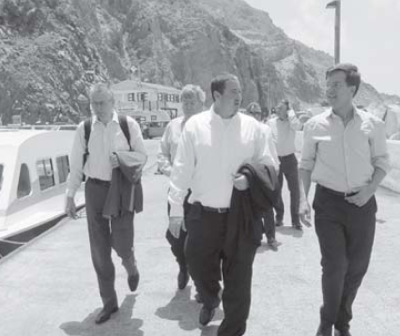Prime Minister Mark Rutte and a Dutch trade mission that travelled with him arrived Friday for a brief visit here. It was for the first time since 2007, a Dutch Prime Minister set foot on Saba, reported The Daily Herald. Commissioner Chris Johnson extended the Island Government’s “heartfelt welcome” to the Prime Minister during a joint press conference at Queen’s Garden Resort. Commissioner Johnson pointed out that the 2015 evaluation would be an opportunity to review legislation.
Rutte stressed that he and Minister of Home Affairs and Kingdom Relations Ronald Plasterk were both “very committed to sitting down and cutting all the red tape on legislation. We have endless laws for Bonaire, Statia and Saba, as if these were Amsterdam or The Hague. We have to cut back on all this typically Dutch detailed legislation. “I, for one, think that we’ve had enough. So when new laws come up I will be very, very critical with colleagues in the cabinet, from health to education or whatever portfolio holder who thinks we should have specialised laws for Saba, Statia and Bonaire. “I will ask very difficult questions and try to get that off the table, because I think we’ve done enough in terms of getting these islands legislated on a European Dutch level,” Rutte said. Commissioner Johnson fully agreed. “We’re well legislated,” he said.
The harbour was visited and showcased the island’s challenges concerning further development. Prime Minister Rutte also met local businesspeople there. He also met with the Executive Council, during which inequality in social security between The Netherlands and Saba, and the evaluation of the constitutional process were discussed.
Rutte thanked Saba for a warm welcome and said he was impressed, calling the island “literally the high point of the kingdom.
He agreed that much still had to be done concerning harbour development and said the remarks made by the local business community had been “insightful.” He said he was content with the progress made in the public entities Bonaire, St. Eustatius and Saba, adding that pertaining to remaining challenges decisions would have to be made based on consultations. Overall, he said he had been impressed by Saba’s economic performance and development, adding that there was still “room for growth” where the medical school was concerned. Rutte agreed that the harbour needed to be brought into shape, as it was an entry point to the island and therefore of “paramount importance.”
Asked what the Dutch cabinet was willing to do for the overall wellbeing of the population, Rutte explained that the transitional process involved the dollarisation of the local economy, which had driven up inflation and ultimately translated into lower purchasing power for the local population, dynamics that were “impossible for me to correct.” He added that the economic crisis and the Dutch government’s large-scale struggle with reining in public finances left “very little room in terms of money. What we can do is offer expertise.”
Commissioner Johnson pointed out that a tax structure that would make the island internationally competitive was vital, as “we have to compete with small, independent nations that can quickly adjust laws, making it very attractive for businesses to come in.” He pointed at the island’s safe environment, which could attract educational institutions and research centres. Asked whether Saba was seeking a tax-haven status, Commissioner Johnson denied that this was a goal. Looking at the scale of the local economy, some tax provisions need to be tailor- made to address local specificities.
Prime Minister Rutte concluded the press conference by saying he had enjoyed his visit and pledged to return to the island, which he described as “beautiful, well-governed, with a clear vision where you know what your selling points are. “In terms of all that, you’re an example to all of us in The Netherlands and in the wider kingdom about how good governance should work. You may be small, but in all these aspects you are big and I really applaud that,” he said.

 Archive of posts from Saba-News.com Archive Saba News
Archive of posts from Saba-News.com Archive Saba News